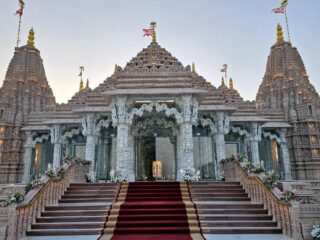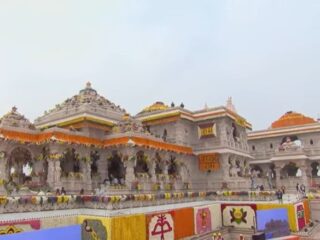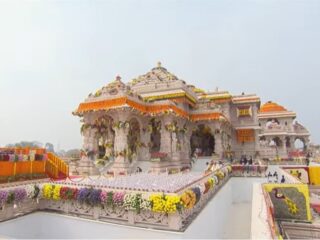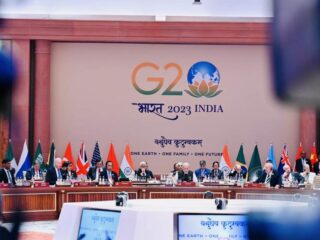Asghar Ali Engineer
(Secular Perspective October 16-31, 2012)
Secularism is the most-discussed subject after, or even more than economic reforms in the country. Wherever I go I am asked to speak on future of secularism or challenges before secularism or prospects of secularism in the country. And I find this concern among secularists right from Kashmir to Kanya Kumari and Gujarat to Orissa. Thus one cannot and one should not, take challenges before secularism lightly as some political scientists would like us to believe.
It is true, as a JNU political scientist pointed out during discussion after I spoke on challenges to secularism in A.N.Sinha Institute, Patna, that in a country like India which is going through capitalist development under over all frame-work of parliamentary democracy, there are bound to be contradictory tendencies during transition period and at times secularism might seem to be supplanted by fundamentalism, but secularism is bound to triumph.
Capitalism, according to him is concerned more with bazaar and sale of products than with any religious or ethnic group. This is true that bazaar is not concerned with Hindus or Muslims or Assamese and Bengalese but this would be so only if development goes without human ideological interventions. But, as we know well, this is not so. There is strong ideological intervention countering secularism almost from cradle to grave, from family to school to socio-political environment.
And this ideological intervention is on the increase for several reasons, political among them being the most important. We know how a political party with Hindutva ideology has grown from begging 4 percent votes in early fifties to 29 per cent votes in late nineties. It is true its growth has since been arrested but it is in political sense. However, its ideology has equal acceptability even today. This contradiction has to be explained.
Voting takes place on number of consideration – from caste to language to region to ideology and it is bound to shift from time to time from one party to another. However, it does not mean that the voter becomes more or less secular. Her or his secularity remains unaffected by ones voting pattern. Some secularists do vote on the basis of secularism but very few, mostly religious minorities and Dalits and tribals, all weaker sections of society and in their case too, it is their security and economic conditions which matter than secular ideology as such.
Thus the question arises what is secular ideology? In India, unlike in the west, its opposite is not religious ideology or opposite of ‘secular’ is not ‘religion’. Its opposite in India is communal i.e. majority community politically and economically dominating over minority community or communities or upper castes of majority community dominating over weaker castes like dalits or denying them due share in political power or economic development.
To achieve this objective of domination the upper castes of majority community uses violence and communal riots take place from time to time. This creates acute sense of insecurity in the minds of religious minorities and lower castes. Violence is used to make these sections of society ‘fall in line’. To perpetuate domination by majority community various myths are spread showing majority in favourable and minorities and low castes in bad light.
We must keep this in mind that these myths cannot acquire credibility unless certain socio-religious culture prevails in the country. This is achieved through educational and cultural institutions. For a stable secular ideology what we need is strong secular cultural Base. It is conspicuous by its absence. Even in Government institutions which are supposed to be secular one finds, and quite often, immersed in religious atmosphere. Not only that all religious festivals are celebrated with fervour and enthusiasm by Government employees but one even finds small temple in employees’ chambers or at least photographs of deities.
Of course one is free to follow ones religion and there cannot be any curb on it but its conspicuous display in Government institutions is, un- if not anti-secular. Also our education system instead of helping create secular culture helps in consolidating communal outlook, apart from anti-woman or gender discriminatory attitudes. It also helps perpetuate anti-dalit attitude. In Shishu Madirs run by RSS, this is done in much more conspicuous manner and from these schools run by RSS hundreds of thousands of children come out every year.
It is these children who ultimately end up in various Government employments like police, teaching, low level bureaucrats and so on and it is these people who enforce law and order situation and teach in schools or execute various government schemes. The low level police officials are usually highly communalized as my experience with them in workshops clearly show. After recruitment they are imparted only professional training and there are no lectures on secularism which constitutes the very fabric of our political ideology.
We have to plead with high level police officers to arrange police workshops on communal harmony. These workshops greatly change socio-cultural outlook of policemen, particularly their attitude towards minorities. This shows that if our school syllabus are creatively designed they can greatly help in creating a strong secular base but unfortunately those who write text books themselves are deeply influenced by communal ideology and go on reproducing that culture.
Equality, human dignity and gender equality provide strong base for secular culture. These values are hardly ever mentioned, much less emphasized, in our education system. Indian society even today, despite its constitutional values and provisions, tends to deeply hierarchical and discriminatory. Jawaharlal Nehru wanted to cultivate scientific temperament through educational system. However, our education system is cultivating deeply conservative system instead.
Even beginning has not been so far made for cultivating such a temperament. Though it is not easy, particularly in small towns and rural areas but even beginning has not been made even in elite schools in big cities. These elite schools which are accessible only to children of upper classes lay more stress on preparing their students for professional courses that for any degree of scientific temperament.
With such weak cultural base and orthodox and religiously conservative atmosphere, one can hardly expect secular culture to thrive in India. And add to this the strategies our politicians adopt to win elections. They mainly appeal to our caste, communal, linguistic and religious identities and thus intensify divisive tendencies. Today’s politics has become mainly identity politics.
And to cater to these identities one has to be seen actively participating in various religious and caste festivals which are celebrated with increasing enthusiasm every year. Naturally majority religious festivals take the cake. Every political party and political leader puts up huge hoardings and Mandaps on such occasions with their huge photographs. And they also compete with each other in throwing Iftar parties during the holy month of Ramzan.
During the election of 1999 even BJP was competing with the Congress in making its Iftar party more luscious and grand in nature. The food items to be served were being kept secret so that the other party should not copy. These parties are nothing but to capture votes. Thus for our politicians secularism in a good vote catching device and one thus can say that our secularism is vote based and not value based.
What is important is our constitution and values enshrined in it. Our politicians and those supporting them never hesitate to violate provisions and values of the constitution, if it serves their political purpose. Even to appeal to sectarian identities is thoroughly unconstitutional in letter and spirit but, as pointed out above, our polity thrives on such appeal.
It is true that many communities and castes like Muslims and others have been left out in educational and economic fields but to announce schemes with a view to win elections is certainly unconstitutional and attracts charge of appeasement which BJP, a communal outfit never tires of doing. But instead such castes and communities must be give special schemes to improve their lot and to overcome their backwardness, including reservation. The secular ruling parties should have done it right from the day India became independent. It would have helped not only minorities but it would have enabled secular parties to fulfill their constitutional commitment and secular duty.
There is great deal of difference between value based secularism and vote based secularism. It is high time India adopts value based secularism.
———————————————————
Centre for Study of Society and Secularism
Mumbai.




